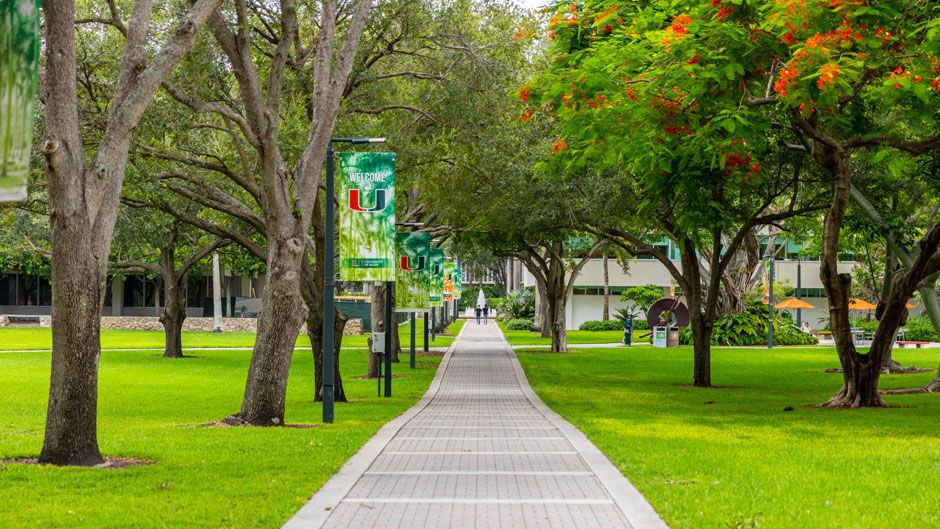The University of Miami is reaching new heights in its efforts to build a greener U. Recently, the Arbor Day Foundation honored the university with a 2019 Tree Campus USA designation. It was the sixth yearly award in a row.
“I think anyone who comes to Miami and the UM campus can tell that we have a really lavish vegetation everywhere, and it is clear that we have tried to plant trees in the right places to follow Florida friendly landscaping guidelines,” said Teddy Lhoutellier, sustainability manager at the University of Miami. “This recognition represents the hard work that we have put into caring for our canopy and planting the right tree in the right place.”
Tree Campus USA, a national program launched in 2008 by the Arbor Day Foundation, honors colleges and universities and their leaders for promoting healthy trees and engaging students and staff in the spirit of conservation. Leaders across the university, including Jessica Brumley, vice president for facilities operations and planning, were delighted to hear the news.
“We are so proud to support a program that has immense impact on helping colleges and universities establish and sustain healthy trees, inspires college students to get involved and become conservation leaders, as well as engages the campus community in environmental stewardship,” said Brumley. “Receiving the Campus Tree USA distinction for the 6th year is truly an honor.”
To obtain this distinction, the University of Miami met the five core standards for an effective campus forest management, including establishment of a tree advisory committee, evidence of a campus tree-care plan, dedicated annual expenditures for its campus tree program, an Arbor Day observance, and the sponsorship of student service-learning projects.
The University of Miami has a unique landscape architecture with elements designed specifically for its climate and natural setting. Its landscape planning has become renown worldwide as a “campus in a tropical garden.” The campus enjoys a number of important vegetated areas which include Lake Osceola, The Gifford Arboretum, the Ibis Natural Trail, the Palmetum, and the Butterfly Garden. Lhoutellier said that the goal is to guarantee that the standards of beauty, sustainability, and environmental stewardship are respected and applied on the campus landscape.
“We strive to promote the use of native plants or low-maintenance plant species, increase species diversity and tree canopy, develop environmentally friendly landscape designs to conserve energy and water, reduce the urban heat island effect on campus, promote improvements in air quality, and finally to protect existing campus canopy during construction and renovation projects,” he explained.
Lhoutellier has been part of a myriad of initiatives across campus that include promoting waste reduction practices and helping install solar systems. In 2019 he was honored with the Roberta “Bosey” Fulbright Foote Prize for improving the environment, reducing waste, and inspiring others to join the U’s sustainability efforts.
“I decided to specialize in sustainability after realizing that the world we are destroying with the fossil fuel business-as-usual scenario is not the one I want for grandchildren. In my personal case, it was reading ‘The Hydrogen Economy’ by Jeremy Rifkins that really opened my eyes,” he explained.
In the announcement of the recognition, the Arbor Day Foundation stated, “we celebrate your diligence in improving the environment and quality of life at University of Miami in 2019. We know that 2020 has brought unprecedented challenges—but you have shown that your commitment to trees is unwavering. Now, more than ever, thank you for contributing to a healthier planet for all of us.”

